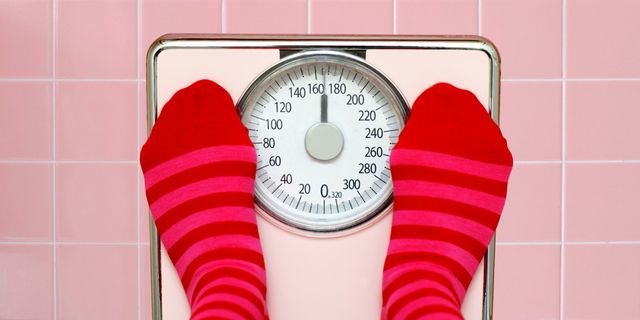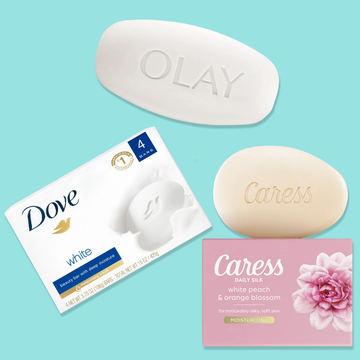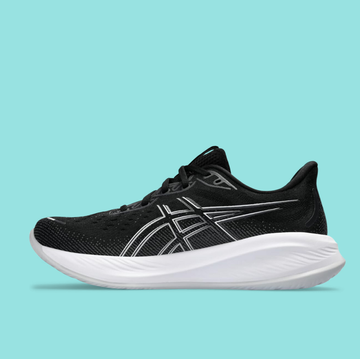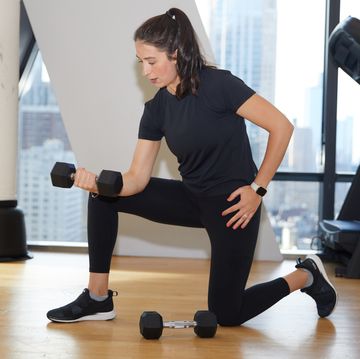We’ve all been tempted to swear off the scale more than once. However, research shows that people who weigh themselves often are more likely to lose weight than those who weigh themselves rarely or not at all.
More importantly, keeping track of your weight dips or spikes can help you identify more serious health issues, such as thyroid problems or diabetes.
But even the weight-conscious should beware: If you’re guilty of making the following most-common scale mistakes, you could be sending yourself into an unnecessary ‘What is going on here?!’ spiral.
1. You’re weighing yourself after you shower.
Your weight fluctuates throughout the day depending on your level of activity and what you eat. So while you probably already know that it's best to weigh yourself first thing in the morning — before you've eaten or used the bathroom — you should also add one more parameter to the list: before showering.
“Your skin is the largest organ in the body and absorbs fluid easily,” says Dr. Keith Kantor, a leading nutritionist and CEO of the Nutritional Addiction Mitigation Eating and Drinking (NAMED) program. “After a swim or a shower, your body can absorb 1 to 3 cups of water, increasing your true weight by a few pounds.”
2. You’re not looking at your weekly average.
It might help with anxiety surrounding the scale, but weighing yourself only once a month or even once a week isn't ideal. Instead, Dr. Spencer Nadolsky, a board-certified family and obesity physician with RP Health, encourages patients to look at weekly averages to stave off weight-related anxiety.
“If for some reason you have an upward weight fluctuation and missed the other daily weights, that could lower the average weekly weight,” Nadolsky says.
3. You’re using a scale that isn't calculating all the relevant stats.
Just like finding the right partner, you can find a scale nowadays that's tailored to your specific lifestyle.
Are you super active? There’s a scale for that: The WW by Conair glass body fat scale has a fitness mode that lets you select whether you're moderately or highly active, which helps the scale fine-tune your body analysis readings.
Plus, you can see five different measurements — weight, body fat percentage, body water percentage, bone mass density, and BMI — at once, then carry on with your day.
4. Your scale is on the wrong surface.
It might be called the bathroom scale, however, most bathrooms have a floor that’s made of tile — which is a problem.
“If a scale is on carpet, uneven tile, or wood it can also appear to be calibrated poorly,” says Kantor. A flat, hard surface is ideal for proper read-outs.
5. You’re eating loads of sodium before stepping on.
Consuming excess sodium can cause you to retain more fluid then normal, which can result in higher-than-usual numbers if you ate a salty meal before bed, says Kantor.
“This is especially true for fast foods, soups, fried foods, processed meats like bacon, sausage, or cold cuts,” he says. “Chinese, Japanese, or Thai foods will also cause you to bloat due the high sodium content of the sauces used in those foods.”
Cut back on the chow mein for a better weigh-in.
6. Your display is too hard to read.
Gone are the days of small dials spanning a range of numbers that are so hard to interpret, you end up walking away feeling defeated when you shouldn't be.
Make sure you get yourself a scale that has clear, concise number read-outs, like the WW by Conair digital glass scale, which has a blue backlight that makes it oh-so-easy to read the numbers on the display. (The sleek design is simply a bonus.)
7. You're not keeping your menstrual cycle in mind.
If it's that time of the month when you see a sudden spike in the scale, don't freak out: “Women retain more fluid right before their menstrual cycle starts,” says Kantor. “There is a lot of fluid retention that can influence weight gain by up to 7 to 8 pounds.”

















